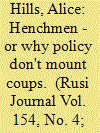| Srl | Item |
| 1 |
ID:
090511


|
|
|
|
|
| Publication |
2009.
|
| Summary/Abstract |
Contemporary security challenges are blurring the boundaries between military and policy forces. In Africa, however, the distinction remains, with policy unable or unwilling to take on a more politicized role. Regardless of rhetoric, regime and resources, senior officers rarely build power bases comparable to those of the military. Police perpetuate rather than create political order, and hence, except in a few examples, do not defy the status quo.
|
|
|
|
|
|
|
|
|
|
|
|
|
|
|
|
| 2 |
ID:
089473


|
|
|
|
|
| Publication |
2009.
|
| Summary/Abstract |
Previous research on anti-corruption reform in Africa falls into two camps. The first explores 'best practices' and policy approaches to controlling corruption, while the second focuses on the politics of anti-corruption 'reform', arguing that official anti-corruption campaigns aim to mollify donors while using corruption charges instrumentally to undermine rivals and shore up personal loyalty to the president, and thus have no chance of controlling corruption. This paper suggests that, while the neopatrimonial context is a very significant limiting factor in anti-corruption reform, limited progress is possible. Examining the motivations and effects, intended and unintended, of anti-corruption reforms in Kenya and Nigeria, it finds that while the Kenya Anti-Corruption Commission has indeed been politically marginalised and largely ineffectual, the more autonomous and activist, but politically instrumentalised, Economic and Financial Crimes Commission in Nigeria has had a measure of success. The analysis suggests that this is explained by the EFCC's independent prosecutorial powers and the institutionalisation strategies of its chairman.
|
|
|
|
|
|
|
|
|
|
|
|
|
|
|
|